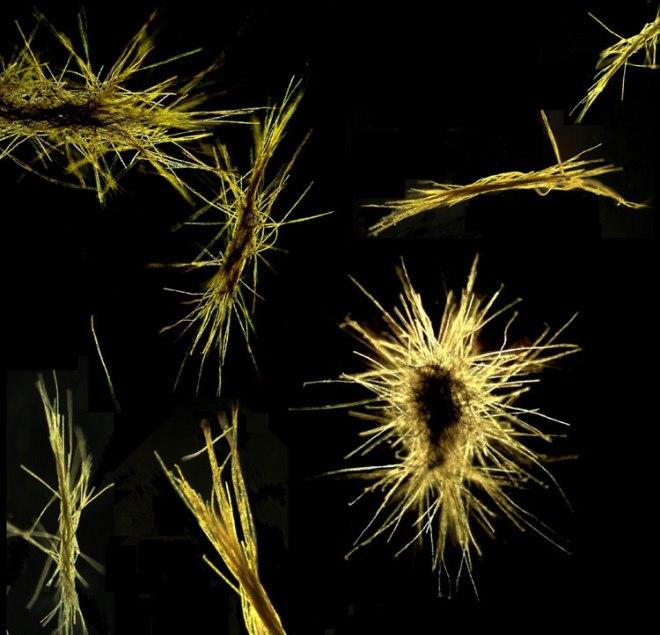Climate change can irreversibly force key ocean bacteria in overdrive
by WHOI on 15 Sep 2015

New research by scientists at WHOI and Univ. of California, demonstrates that Trichodesmium, a key organism in the ocean’s food web, will start reproducing at high speed as carbon dioxide levels rise, with no way to stop when nutrients become scarce Abigail Heithoff / WHOI
Imagine being in a car with the gas pedal stuck to the floor, heading toward a cliff’s edge. Metaphorically speaking, that’s what climate change will do to the key group of ocean bacteria known as Trichodesmium, scientists have discovered.
Trichodesmium (called “Tricho” for short by researchers) is one of the few organisms in the ocean that can “fix” atmospheric nitrogen gas, making it available to other organisms. It is crucial because all life – from algae to whales – needs nitrogen to grow.
A new study from University of Southern California and Woods Hole Oceanographic Institution (WHOI) shows that changing conditions due to climate change could send Tricho into overdrive with no way to stop – reproducing faster and generating lots more nitrogen. Without the ability to slow down, however, Tricho has the potential to gobble up all its available resources, which could trigger die-offs of the microorganism and the higher organisms that depend on it.
By breeding hundreds of generations of the bacteria over the course of nearly five years in high carbon dioxide ocean conditions predicted for the year 2100, researchers found that increased ocean acidification evolved Tricho to work harder, producing 50 percent more nitrogen, and grow faster.
The problem is that these amped-up bacteria can’t turn it off even when they are placed in conditions with less carbon dioxide. Further, the adaptation can’t be reversed over time – something not seen before by evolutionary biologists, and worrisome to marine biologists, says David Hutchins, lead author of the study.
“Losing the ability to regulate your growth rate is not a healthy thing,” said Hutchins, professor at the USC Dornsife College of Letters, Arts and Sciences. “The last thing you want is to be stuck with these high growth rates when there aren’t enough nutrients to go around. It’s a losing strategy in the struggle to survive.”
Tricho needs phosphorous and iron, which also exist in the ocean in limited supply. With no way to regulate its growth, the turbo-boosted Tricho could burn through all of its available nutrients too quickly and abruptly die off, which would be catastrophic for all other life forms in the ocean that need the nitrogen it would have produced to survive.
Some models predict that increasing ocean acidification will exacerbate the problem of nutrient scarcity by increasing stratification of the ocean – locking key nutrients away from the organisms that need them to survive.
Hutchins is collaborating with Eric Webb of USC Dornsife and Mak Saito of WHOI to gain a better understanding of what the future ocean will look like, as it continues to be shaped by climate change. They were shocked by the discovery of an evolutionary change that appears to be permanent – something Hutchins described as “unprecedented.”
“Tricho has been studied for ages. Nobody expected that it could do something so bizarre,” he said. “The evolutionary biologists are interested in it just to study this as a basic evolutionary principle.”
The team is now studying the DNA of Tricho to try to find out how and why the irreversible evolution occurs. Earlier this year,
research led by Webb found that Tricho’s DNA inexplicably contains elements that are usually only seen in higher life forms.
“Our results in this and the aforementioned study are truly surprising. Furthermore, they are giving us an improved, view of how global climate change will impact Trichodesmium and the vital supplies of new nitrogen it provides to the rest of the marine food web in the future,” Webb said.
“There’s a lot of interest in understanding how organisms will respond to increasing CO2,' said Mak Saito, a co-author on the study from the Woods Hole Oceanographic Institution. 'These findings are quite surprising in determining that the important marine microbe Trichodesmium adapts to high CO2, but can’t revert back once CO2 is reduced again. This has implications not only for our understanding of the evolution and biochemical processes that underlie this irreversible change, but also for policy makers emphasizing the urgency of acting to reduce fossil fuel emissions sooner rather than later.”
The research was published in Nature Communications on Sept. 1, 2015.
If you want to link to this article then please use this URL: www.sail-world.com/138439